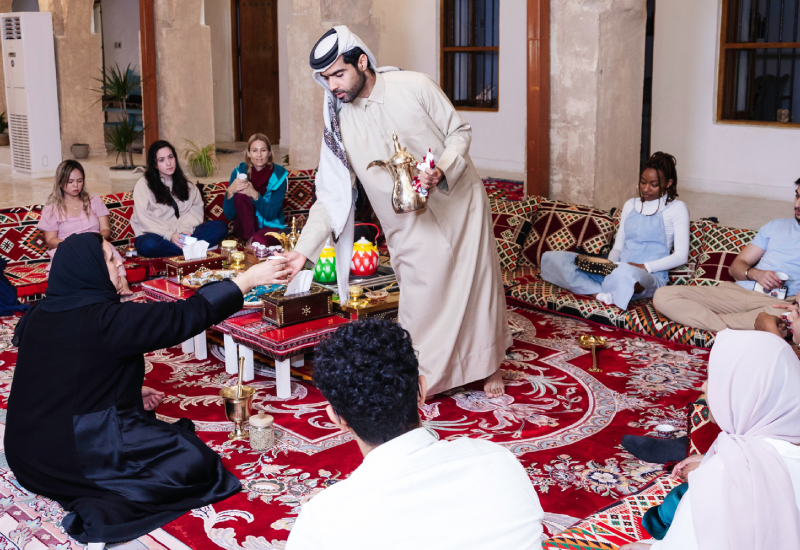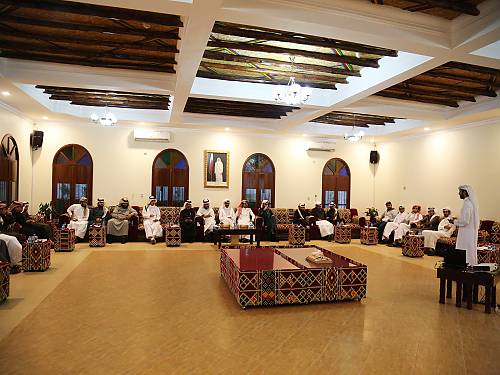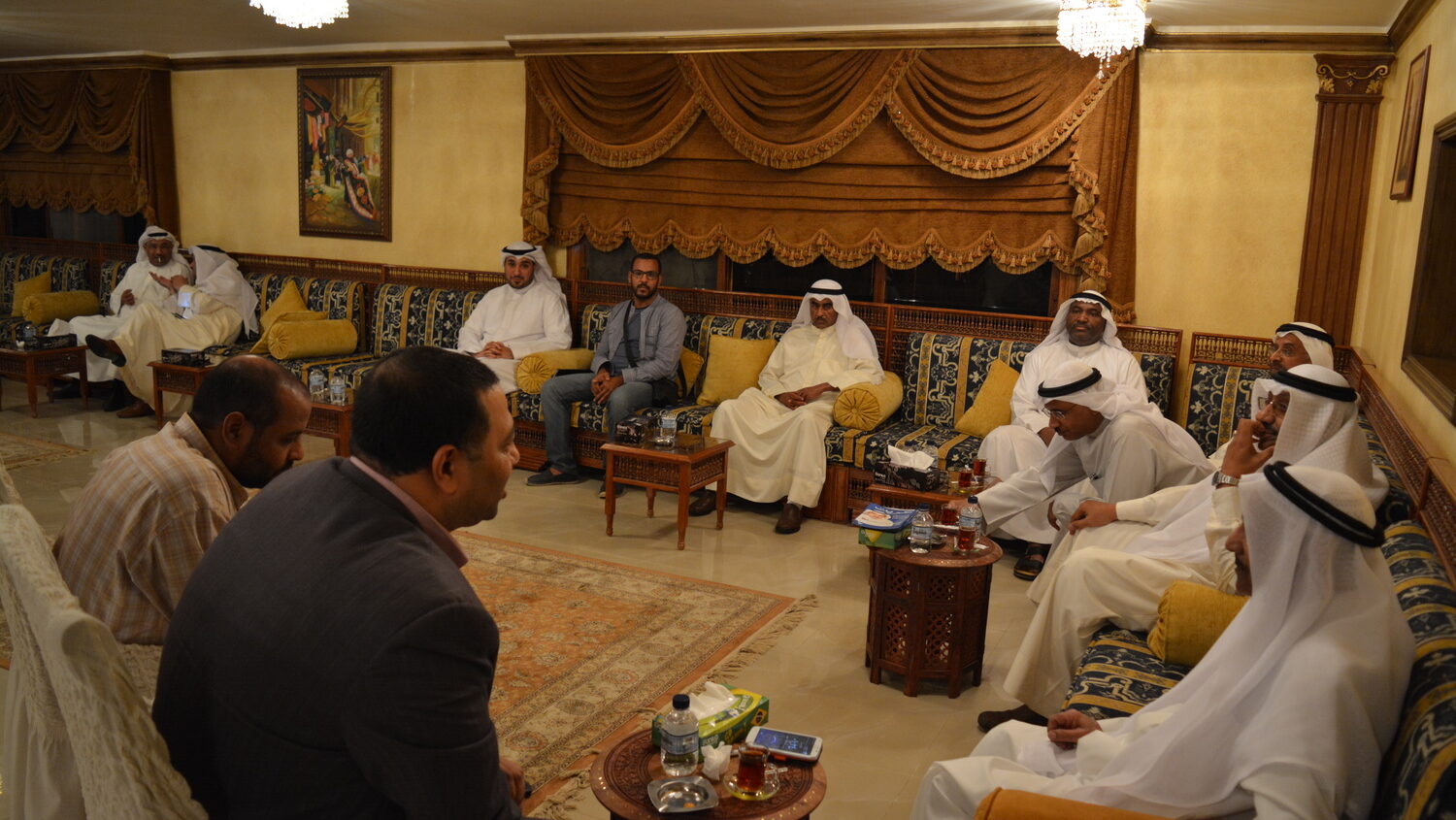Majlis in Kuwait is one of the most cherished traditions that capture the spirit of togetherness and cultural pride. The Majlis, an Arabic word meaning “a place of sitting,” is much more than a gathering space it is the social heart of Kuwaiti life, a living symbol of connection, respect, and open dialogue. From the earliest days of Kuwait’s history to the present modern era, the Majlis has remained an enduring institution where people come together to share stories, exchange ideas, solve disputes, and strengthen relationships. It reflects the warmth, generosity, and hospitality that lie at the core of Kuwaiti culture.
For centuries, Kuwaitis have gathered in Majlises across cities and villages, large and small, where men, and increasingly women in recent years, meet to discuss community issues, politics, religion, and everyday life. The setting might vary] from luxurious halls in modern homes to modest spaces in desert tents but the purpose remains the same: to create an open environment of trust and respect where everyone is welcome.
A Living Tradition Rooted in Hospitality
Hospitality is one of the most important values in Kuwaiti society, and the Majlis is where it comes alive. When a guest enters, they are greeted warmly with coffee, dates, and kind words. This ritual of welcome isn’t just a custom it is a sign of mutual respect and recognition of the guest’s worth. The aroma of Arabic coffee (gahwa), the sound of laughter, and the easy flow of conversation all create a sense of belonging that defines Kuwaiti identity.
The Majlis hosts people from different walks of life neighbors, relatives, businessmen, scholars, and even travelers passing through. Everyone is treated equally within its walls. It represents the Kuwaiti way of seeing social interaction not as a formality but as an act of friendship. This openness has helped preserve harmony across generations and has made the Majlis a foundation of Kuwaiti unity.
A Bridge Between Generations and Ideas
The Majlis plays a vital role in connecting generations. Older members of the community, known for their wisdom and life experience, share stories from the past tales of pearling, trade, desert life, and the growth of Kuwait into a thriving modern state. Young people, in turn, bring new perspectives, ideas, and ambitions that shape the country’s future. This intergenerational exchange ensures that traditional values are preserved while allowing society to adapt and evolve.
In many Kuwaiti families, the Majlis also serves as a school of life. Younger members observe how their elders speak, listen, and interact respectfully. They learn the importance of patience, diplomacy, and empathy qualities that define Kuwaiti character. Through daily interactions in the Majlis, values like loyalty, generosity, and responsibility are naturally passed down, keeping the social fabric strong.
The Political and Social Pulse of Kuwait
Beyond being a place of casual gatherings, the Majlis has long played a key role in shaping public opinion and fostering civic awareness. In fact, Kuwait’s democratic spirit can be traced back to this very tradition. Before the establishment of the National Assembly, tribal leaders and citizens used Majlises as forums to discuss important community matters and offer advice to rulers. It was here that decisions about trade, defense, and alliances were often debated and made collectively.
Even today, the Majlis continues to influence public life. Many politicians hold regular open Majlises, welcoming citizens to voice their concerns and share ideas directly. This practice strengthens the bond between leaders and the people, ensuring transparency and mutual respect. Unlike formal political settings, the Majlis offers a more personal and informal way to discuss national issues, where everyone’s voice can be heard without barriers.

Majlis as a Symbol of Equality and Dialogue
One of the most beautiful aspects of the Majlis is its commitment to equality. Regardless of wealth, social status, or background, everyone is given a place to sit and speak. This sense of equality reinforces the unity that Kuwaiti society values deeply. The open format encourages dialogue, tolerance, and understanding] qualities that are essential for any thriving community.
Disagreements are not uncommon in Majlises, but they are usually handled with respect and wisdom. The aim is not to win arguments but to find solutions that benefit everyone. This approach to discussion has helped Kuwait build a culture of mutual respect, where differences are seen as opportunities to learn rather than divide.
The Evolving Role of Women in the Majlis
Traditionally, the Majlis was seen as a male-dominated space, but in modern Kuwait, this is changing. Women now host their own Majlises, where they gather to discuss social issues, business, education, and family life. These spaces provide women with opportunities to express opinions freely and contribute to community discussions in meaningful ways.
In elite circles and even among younger generations, mixed-gender Majlises are becoming more common, reflecting the evolving social norms of Kuwaiti society. Women’s Majlises have also become platforms for networking, empowerment, and leadership development, marking a new chapter in Kuwait’s cultural evolution while maintaining the values of respect and hospitality.
Majlis and Modern Communication
In the age of technology, where social media and digital platforms dominate communication, the Majlis remains a timeless reminder of the importance of face-to-face interaction. While WhatsApp groups and online discussions have taken on some of its roles, they cannot replace the warmth and depth of real human connection that the Majlis offers.
However, Kuwaitis have found creative ways to blend tradition with modernity. Some Majlises are now livestreamed online, allowing people abroad to join virtually, especially during Ramadan or special gatherings. This fusion of old and new ensures that the essence of the Majlis continues to thrive in a fast-changing world.
Majlis in Kuwait: A Place for Cultural Exchange and Friendship
The Majlis is not just for Kuwaitis it is also a welcoming space for foreigners and expatriates living in the country. Visitors are often invited to experience Kuwaiti hospitality firsthand, offering them a chance to understand local customs and values. Through such interactions, cultural bridges are built, fostering mutual respect and friendship between Kuwaitis and people from around the world.
In this way, the Majlis acts as Kuwait’s informal ambassador of goodwill. It showcases the country’s openness, kindness, and inclusive spirit, helping outsiders feel at home while deepening cultural understanding.
Majlis During Ramadan and Celebrations
During the holy month of Ramadan, the Majlis takes on an even greater significance. It becomes a space of spiritual reflection, generosity, and unity. Families and friends gather after evening prayers to break their fast together, share food, and discuss faith and life. The sense of brotherhood and compassion during these gatherings strengthens community bonds and brings people closer to their faith and traditions.
Similarly, during weddings, national celebrations, or important family events, the Majlis becomes a center of joy and festivity. It is where congratulations are offered, stories are shared, and laughter fills the air. These gatherings not only mark special occasions but also reaffirm the collective identity and shared happiness of the community.
Architectural Beauty and Cultural Identity
The design of a Majlis reflects both aesthetic beauty and deep cultural symbolism. Traditional Majlises are often decorated with fine carpets, cushions, and intricate wooden patterns. The layout is open, promoting inclusivity and ease of conversation. In modern homes, the Majlis often occupies a prominent space, representing the family’s openness and commitment to hospitality.
Every detail from the seating arrangement to the serving of coffee carries meaning. It reflects a harmony between comfort and respect, simplicity and elegance. The atmosphere encourages relaxation while maintaining an air of dignity and refinement that is uniquely Kuwaiti.
The Majlis and Education
Beyond social and political discussions, the Majlis has historically been a place of learning. In earlier times, scholars and teachers used Majlises to share knowledge about religion, literature, and science. It was common for young learners to sit around elders, listening carefully to stories and lessons that shaped their understanding of the world.
Even today, many Kuwaiti intellectuals and professionals hold Majlises that serve as discussion circles for academic and cultural topics. These gatherings encourage curiosity, debate, and intellectual growth] keeping the spirit of lifelong learning alive in Kuwaiti society.
The Majlis as a Space for Mediation and Resolution
The Majlis also plays an important role in resolving community conflicts. Tribal leaders, elders, and respected members of society often mediate disputes in these gatherings, ensuring that justice is served with compassion. This system of community-led resolution, based on dialogue rather than confrontation, reflects the deep trust that Kuwaitis place in personal relationships and moral integrity.
It reinforces the idea that harmony is best achieved through understanding, not force. Many long-standing issues have been peacefully resolved in Majlises, proving that this ancient institution still holds immense relevance in promoting social peace.

The Majlis in Today’s Kuwait
In modern Kuwait, the Majlis continues to adapt to changing lifestyles while keeping its traditional values intact. Today’s Majlises may feature large screens, air conditioning, and even digital registration for guests, but the heart of the experience the human connection remains unchanged.
Young Kuwaitis, despite their busy lives, still see the Majlis as an essential part of their social and cultural identity. For them, it is not just a place to meet but a reminder of who they are and where they come from. It is where they learn respect, patience, and the art of meaningful conversation.
Cultural Preservation Through the Majlis
In a world that moves fast and often values digital connections over personal ones, the Majlis serves as a bridge to Kuwait’s roots. It preserves the stories, traditions, and values that define the Kuwaiti way of life. Many families take pride in maintaining regular Majlises, passing the responsibility from one generation to the next.
Cultural preservation isn’t about resisting change it’s about ensuring that the essence of identity remains alive. The Majlis achieves exactly that by blending tradition with modernity, reminding every Kuwaiti that progress and heritage can coexist beautifully.
Global Recognition and Influence
The importance of the Majlis extends beyond Kuwait. Across the Gulf region, similar traditions exist, but the Kuwaiti Majlis is often praised for its openness and civic influence. International visitors frequently admire how this institution strengthens social ties and promotes democratic dialogue in everyday life.
In a world often divided by misunderstanding and distance, the Majlis stands as a model for peaceful coexistence a living example of how conversation can unite communities and nations.
The Enduring Legacy of the Majlis
As Kuwait continues to move forward in the 21st century, the Majlis remains a constant reminder of what truly matters connection, respect, and humanity. It stands at the crossroads of the past and the future, offering wisdom from one and hope from the other.
For Kuwaitis, the Majlis is not merely a room or tradition; it is a way of life, a heartbeat that keeps their culture alive. It symbolizes everything that defines the nation its hospitality, its sense of equality, its belief in dialogue, and its love for community.
Conclusion: The Majlis as a Timeless Symbol of Kuwaiti Spirit
In every corner of Kuwait, from the grand Majlises of city homes to the simple gatherings in rural areas, the same spirit thrives the spirit of openness, respect, and unity. The Majlis has shaped generations, guided leaders, and nurtured friendships that transcend differences. It has given voice to the people and offered comfort in times of joy and sorrow.
As Kuwait embraces the future, the Majlis will continue to serve as its moral compass a place where wisdom meets warmth, where tradition meets progress, and where every person finds a seat, a story, and a sense of belonging. In its enduring light, the Majlis reminds everyone that while the world may change, the values that unite us conversation, compassion, and community are eternal.
Do follow Gulf Magazine on Instagram.
Also Read – Traditional Kuwaiti Wedding Rituals: A Joyful Celebration of Love and Culture



